
views
- To regain your happiness, take time to do things you enjoy and prioritize self-care.
- Spend time in nature and with people who make you feel good.
- Eat well, exercise, and practice gratitude.
Follow your passion.

Pour your energy into things you really value. Adjust your existing priorities in life. Identify the things that you’re truly passionate about—the things that mean the most to you in life—and budget your time accordingly. If you love fashion and beauty, start a blog and write about clothing or products, or start thrifting with a friend. If you enjoy playing instruments, learn a new song, or pick up a new technique that you've been meaning to practice. If you love learning and school, educate yourself further by devoting your time to your studies. Visit the library if it has been a while.
Get outside for more sunlight.

Vitamin D and time in nature increase happiness. Seasonal depression likely occurs because of the lack of sunlight. But it’s not just sunlight you need; spending 2 hours a week in nature is proven to boost your mood and energy. A good dose of time outside can do wonders for your mood, so get out there! Wear sunscreen if you’re going to go out in the sun. If you live somewhere with limited sunlight, ask your doctor about investing in a lightbox that provides a good source of natural light.
Try new things.

Variety is the spice of life, so change things up. Find something that you’ve long wanted to do but felt held back from doing—and do it! It can be a small change or a big activity, so long as it’s something new that could help you cultivate joy. Life experiences that cause unhappiness, like a job loss or a break-up, can also be a great opportunity to try something new! Our expert, life coach Michelle Shahbazyan, agrees: “Go out there and have no limits because every single person on the planet has something that they can do to start over fresh, whether it's finding a new partner or finding a new career.”
Get out and socialize.
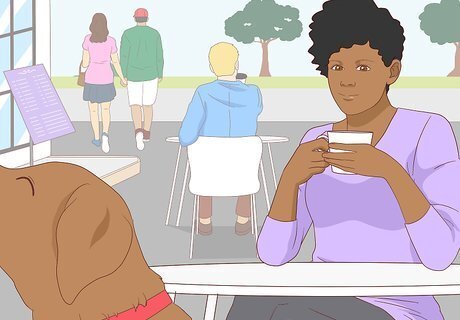
Meet new people or reach out to old friends. Just being around other people can be helpful when you’re grieving, depressed, or even temporarily unhappy. Go to public places as much as you can. The more you’re around people, the better you’ll feel. Instead of making coffee at home, grab a cup at a local spot. Instead of reading the paper at home, read it at the library. Being around other people reminds you that life goes on and the world keeps spinning during both good days and bad. When situations arise that make it difficult to physically be around other people (such as the COVID-19 pandemic), lean on technology to help you maintain social connections. Something is better than nothing!
Journal about your feelings.
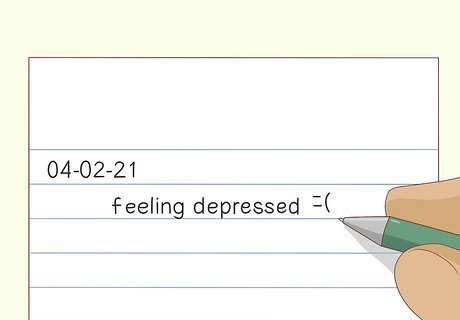
Process the way you feel by writing about it. Life coach Michelle Shahbazyan says, “When you feel pessimistic, write down your problems one by one. The problem that pessimism creates is this white noise for people. If you can sit down and listen in to what that white noise is in the back of your mind, it’s always finite. Write those things down. Make a list.” Do this regularly. Writing about how you feel and listing your woes every day can really reinforce your sense of control and well-being.
Cut back on social media.
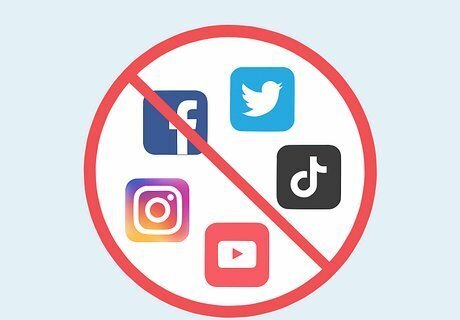
If you feel disconnected, take a break from social media. Social media isn’t always bad, but if you’re not feeling great, science says that social media is going to make you feel worse. Even if it isn’t permanent, temporarily lock or delete your social media accounts to avoid giving into temptation. Leaving social media can help you reconnect with the real world, feel closer to the people in your everyday life, and help you stop comparing yourself to others.
Practice gratitude.

Regularly remind yourself of things you’re thankful for. When any kind of good thing happens in your life, take a moment to savor it and soak it in. At least once a day, mentally list at least 5 things you’re appreciative of. Once you start seeking out all the little reasons you have to be happy, you’ll begin to feel better. No matter what it is—finding your keys, getting a good seat on the bus, hearing a “good job” from your teacher, parent, or boss—be thankful for it! Try writing down a list of things you’re thankful for when you get up in the morning, when you go to bed at night, or both. Be thankful when others show you kindness. Give a genuine “thank you” and take a moment to reflect on the fact that there is good in this world.
Exercise regularly.

Get 30 minutes of daily exercise to feel your best. Physical activity has a massive impact on your mood. If your body isn’t getting the activity it needs, start small and build up from there. Take a walk, start jogging, do calisthenics at home, or do some light weightlifting. Exercise has a direct effect on your mood and overall happiness. Working out releasing endorphins that help to counteract the effect of stress on the body. Find an exercise routine that you enjoy doing. If you hate lifting weights for example, you’re unlikely to stick with it. Give your body time to rest and recover between exercise sessions and get enough sleep at night. Like exercise, rest is essential in keeping your energy levels and your mood steady throughout the day.
Eat a healthy diet.
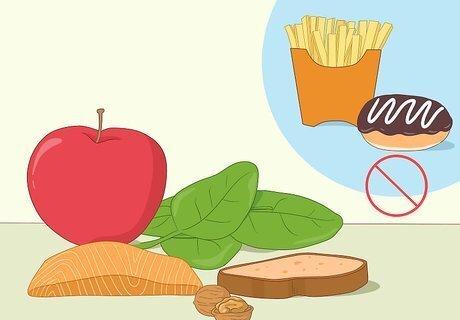
Healthy food improves your mood more than junk food. What you eat affects your mood directly. Junk food might make you feel better for a few minutes, but it’s a short-term “high” that won’t last. For more lasting mood improvement, focus on getting more leafy greens, whole grains, fresh vegetables, and fruits into your diet. Increase your intake of omega-3 fatty acids, which are found in foods like flaxseeds, fish, walnuts, and tofu. Omega-3 supports your brain function and regulates your mood. Stay hydrated by drinking water regularly throughout the day. Problems that impact your mood, like headaches and tiredness, can result from mild dehydration.
Keep yourself busy.
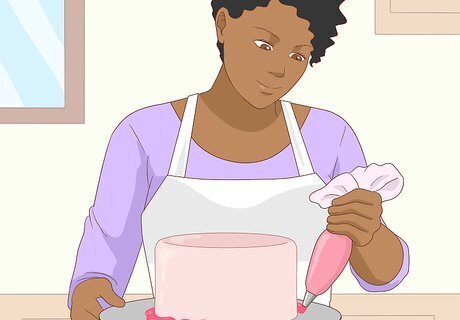
Occupy your mind and body instead of ruminating. Stay busy enough that you don’t have time to just sit and stew over your sadness. However, don’t try to be so super-busy that you leave no time at all to experience your feelings. It’s okay to be unhappy some of the time, but it’s also okay to keep busy so you aren’t unhappy all of the time. Keeping busy by working with your hands seems to be particularly effective. Try baking, cooking, woodworking, needlepoint, gardening, cleaning, playing piano, or a similar hobby or new activity.
Set tiny goals every day.
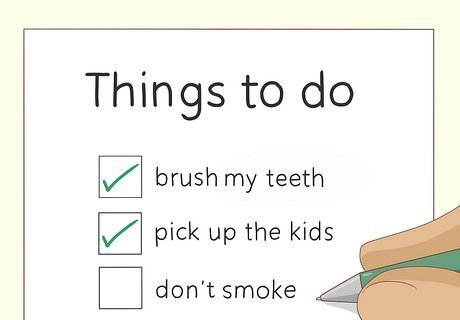
Write out daily goals to give each day direction. Sadness, grief, and depression can negatively impact your sense of purpose. Establishing clear, simple, and challenging (but definitely attainable) goals will help boost your focus and motivation. You’ll know what you need to do each day, and it’ll be super rewarding when you cross each thing off of your checklist! List things that you can do today to make yourself productive. You can include extremely small things, like, “Brush your teeth,” run-of-the-mill but important things, like, “Pick up the kids,” and aspirational things, like, “Don’t smoke as many cigarettes as yesterday.” Write out your accomplishments each day at the end of the day if that works better for you.
Lean on your friends.
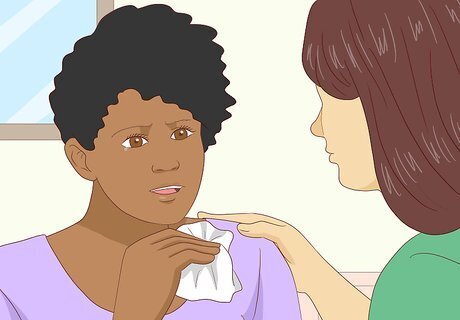
Spend time and share your feelings with those closest to you. If you feel like talking about your sadness, find a close friend or loved one to open up to. Talking about your feelings can really help you process and feel better. If you don’t like talking about your feelings, just hang out with friends and talking about anything—work, sports, etc.—can really help as well. Surround yourself with people who care about you. Having people around you can help bring your overall mood up. You may just want to be alone sometimes, and that’s okay too. Listen to your feelings and find the right balance for you.
Be kind to others.

Making others feel good will naturally make you feel good. People who are generous with their time, talents, and even money really do tend to be happier overall. Putting a smile on someone else’s face by paying for their coffee, shoveling the snow off their sidewalk, or writing them a thoughtful letter will make you smile as well. Just thinking about being generous to others can give you a happiness boost—but actually doing something generous is so much more fulfilling!
Put a smile on your face.

The simple act of smiling gives you a happiness boost. You don’t even need to have anything making you smile to feel better. Of course, it’s even better if you put yourself in situations where you can’t help but smile. Watch a funny movie, take a nature walk, call an old friend, or play with your neighbor’s puppy. With that said, it’s totally okay to express frustration or sadness. Forcing a smile when you want to cry it out isn’t healthy.
Be patient with yourself.
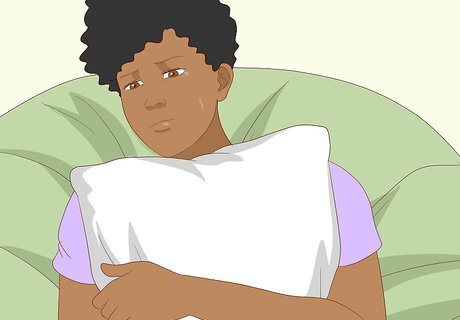
Dealing with depression can take time. There are no quick-fixes for chronic sadness, and that’s okay. Regaining happiness is a process that takes time, and there will definitely be roadblocks and setbacks along the way. Accept that this is all part of the process, so cut yourself some slack. If you have a bad day, shake it off and and keep working toward your goal. For example, it’s okay to be mopey for a while after a breakup. Let yourself be sad and go through the motions for a bit. There’s no set timetable for how long the process should take, but it might be time to start trying to pull yourself out of your funk after a few days.
Talk to your doctor.
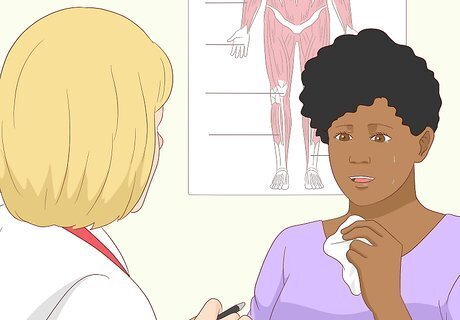
Discuss any signs of depression and treatment options. If you just can’t shake the sadness, see a doctor. Be honest with them about your feelings and symptoms. If you’re diagnosed with a condition like depression, they can direct you to valuable resources to help you return to a healthy state of mind. Symptoms of depression can include a lack of interest in daily activities, feelings of hopelessness, changes in appetite, sleep pattern changes, low energy, irritability, reckless behavior, mental fog, aches and pains, and self-loathing, among others. Treatment for depression usually involves a combination of psychotherapy, lifestyle changes, support networks, and/or medication.
Get help in a crisis.
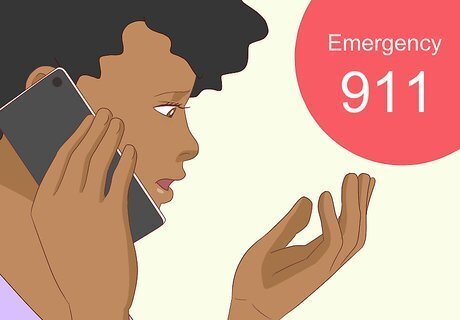
Reach out right away if you’re considering self-harm. Extreme sadness and depression can make you feel isolated, worthless, and empty, and may lead you to think about self-harm or even suicide. Don’t ignore these feelings and don’t be ashamed of them. Talk to someone you trust right away or call emergency services (such as 911 in the U.S.) if you’re in crisis. In the U.S., you can contact the 988 Suicide and Crisis Lifeline by calling or texting 988. In Canada, you can call or text 988 to reach the Suicide Crisis Helpline. Reach the Crisis Text Line by messaging “HOME” to 741741 in the U.S. and Canada, 85258 in the UK, and 50808 in Ireland. You can find the phone numbers for crisis hotline in your country here: https://www.opencounseling.com/suicide-hotlines.















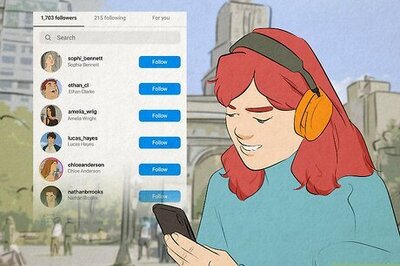



Comments
0 comment